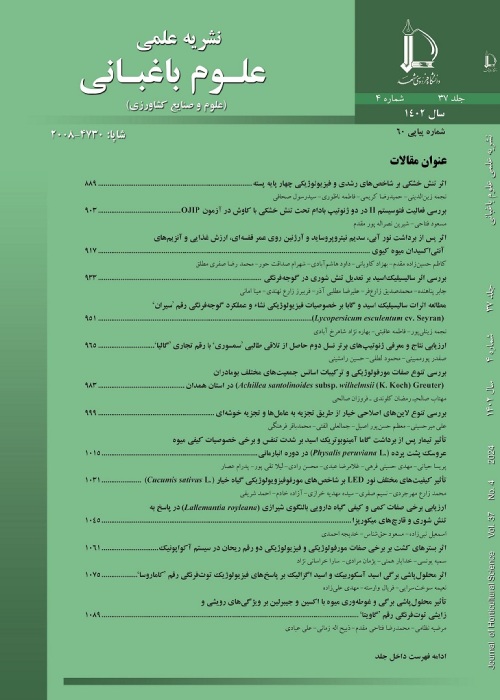Postharvest Effect of Blue Light, Sodium Nitroprusside and Arginine on Shelf Life, Nutritional Value and Antioxidant Enzymes of Kiwifruit
Kiwi (Actinidia deliciosa) is rich in minerals, vitamins and antioxidants. Kiwi fruit is sensitive to ethylene and has high perishability. There are some physical and chemical methods to delay aging and maintain postharvest quality of fruits. Light irradiation is a physical and pollution-free method that has been reported to be effective in controlling fruit decay and increasing its shelf life. Sodium nitroprusside (SNP) acts as an important signal in some physiological activities of the plant. SNP improved the quality and durability after fruit harvest in some fruits.Amino acids are effective in delaying the aging process and increasing the postharvest life of horticultural crops. Arginine plays an important and vital role in plant growth and development processes. The positive effect of arginine in increasing the shelf life of some fruits has been reported. The aim of this study was to increase the shelf life and quantitative and qualitative characteristics of ‘Hayward’ kiwi fruit after harvesting with the use of blue light, SNP and arginine.
Healthy and uniform fruits were selected and exposed to blue light (6, 12 and 24 h) at a wavelength range of 470 nm by LED lamps, SNP (0.5, 1 and 2 mM) and arginine (0.5, 1 and 2 mM). The experiment was performed in a completely random design with 10 treatments in 3 replications with 30 plots and 10 fruits per plot. After immersing the fruits at different levels of arginine, SNP and distilled water (control treatment), the surface of the fruits was dried and then sterilized. The fruits were monitored daily and their quantitative and qualitative properties were recorded during the experiment. Parameters of shelf life, tissue firmness, flavor index, loss of fresh weight, proline, ionic leakage, malondialdehyde (MDA), and dry matter, as well the activity of ascorbate peroxidase (APX), peroxidase (POD) and superoxide dismutase (SOD) enzymes were measured. Analysis of data obtained from sampling during the experimental period and laboratory were performed using SPSS statistical software and comparisons of means was done based on LSD statistical test.
The results showed that SNP at a concentration of 2 mM caused the highest shelf life (117.20 days) and the highest proline content (80.14 mg/kg) in kiwi fruits. The reason for this increased shelf life may be that SNP delays ethylene production process by activating the genetic and biochemical mechanisms, thus increase the postharvest life of ethylene-sensitive products. The highest firmness (4.56 kg/cm2) and the lowest fresh weight loss (1.26%) was obtained in fruits treated with 12 h of blue light. Some of the most important causes of this finding are that blue light delays the peak time of ethylene production, and as a fungal agent, reduces fruits decay after harvesting. The data showed that 12-h irradiation of blue light and 2 mM SNP caused a significant increase in the amount of antioxidant enzymes (SOD, POD and APX) of kiwifruit. Other traits such as flavor index, dry matter content, ion leakage and malondialdehyde were also measured. Blue light treatment can effectively reduce the decay of many fruits during postharvest storage. The study on kiwifruit showed that the qualitative treatments of different lights on various cultivars at different times had a significant effect on some physiological, morphological and gene expression traits. LED irradiation was found to be a suitable method for improving the quality of nutrients and the quality of flavor after harvest of some fruits. SNP was a good treatment to maintain fruit quality and improve disease resistance in kiwi cultivar ‘Bruno’ during storage. Fruits treatment with arginine is a promising technology to reduce cold and brown damages by stimulating the activity of antioxidant enzymes. Plant resistance to environmental stresses due to the use of arginine is in order to the effect of this substance on polyamine accumulation through increasing arginine decarboxylase and ornithine decarboxylase enzymes and increasing proline accumulation by enhancing ornithine amino-transferase enzyme activity as well as increasing nitric oxide through increasing the activity of nitric oxide synthase enzyme. Quality of kiwi fruit decreases during storage due to rapid softening and contamination with some fungi. In this study, effective treatments were used to reduce these complications. Overall, the results of this study showed that 2 mM SNP caused the highest shelf life. The highest firmness and the lowest fresh weight loss were observed in fruits treated with 12 h blue light. 12-h irradiation of blue light and 2 mM SNP caused a significant increase in the antioxidant enzymes of kiwifruit.
- حق عضویت دریافتی صرف حمایت از نشریات عضو و نگهداری، تکمیل و توسعه مگیران میشود.
- پرداخت حق اشتراک و دانلود مقالات اجازه بازنشر آن در سایر رسانههای چاپی و دیجیتال را به کاربر نمیدهد.




